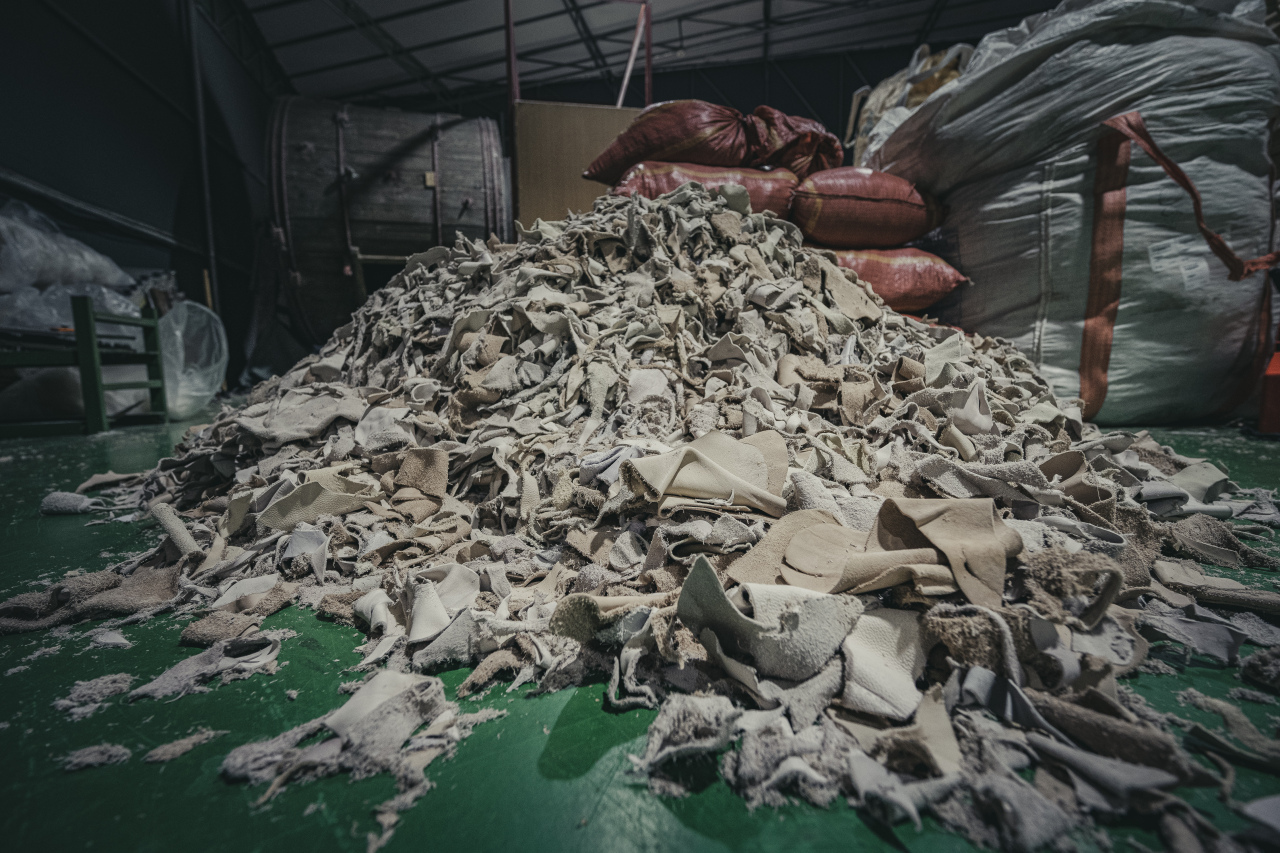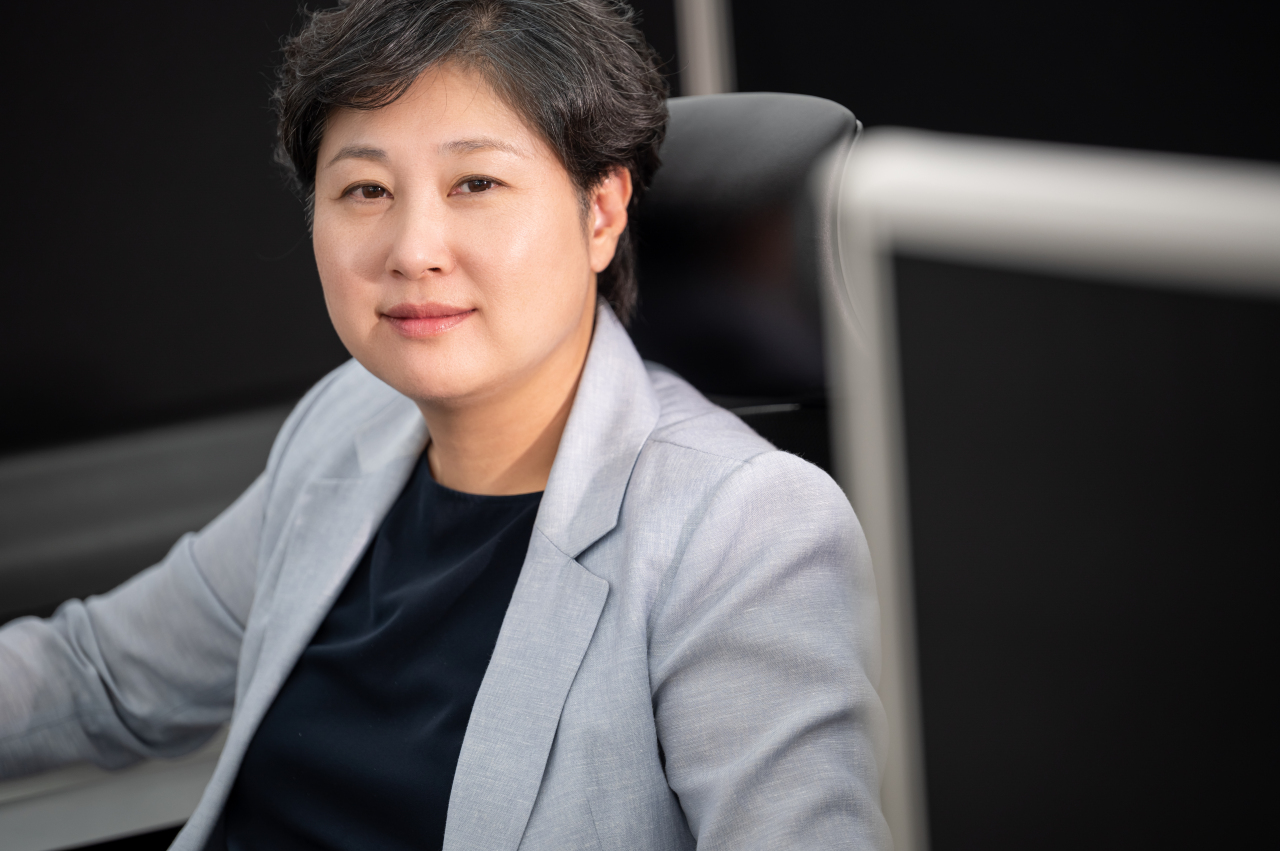 |
A pile of leather scraps at ATKO Planning’s factory in Paju, Gyeonggi Province (ATKO Planning) |
The need to reduce humanity’s carbon footprint is a pressing issue in the textile, fashion and sportswear industries, and a South Korean startup has come up with a way for them to reduce greenhouse gas emissions.
ATKO Planning gained attention in the global market relatively recently as the world’s first company to reuse leather scraps to produce yarn products.
“The company’s technology helps reduce carbon footprints by reusing the sheer amount of leather that is destined for the landfill,” ATKO Planning CEO Kim Ji-eon said in a recent interview with The Korea Herald.
The company is already shipping tons of yarn made of cowhide to Italian luxury fashion house Armani, as well as to Adidas, a German manufacturer of athletic shoes and apparel and sporting goods.
The company’s exports are expected to increase dramatically, as the company is receiving additional orders from partners that increasingly demand sustainability.
Contracts with new partners are also on the way, which will boost the company’s output of recycled leather textiles, Kim said. ATKO Planning is also in talks with global players in different industries, including automakers that have expressed interest in its products -- although the companies cannot be named at the moment due to nondisclosure agreements.
ATKO Planning started out as a one-person business in 2013. Kim said as a designer of leather products, she became increasingly aware of the leather industry and its environmental impact.
It was 2012 when Kim finally decided to quit her job at E-Land and look for a way to better use resources from the dairy industry.
According to Kim, every year in Korea, 44 tons of leather is discarded without being used. To bury it, the country needs a stretch of land four times larger than the Sangam-dong area of Seoul, which measures 8.38 square kilometers.
Globally, the amount of leather that is discarded without being used comes to 7 million tons worldwide, and only 13.7 percent of leather is recycled, she added. When post-consumer leather waste is included, the amount of leather that goes to landfills is even greater.
 |
ATKO Planning CEO Kim Ji-eon (ATKO Planning) |
“I felt I could do something with that unused leather,” Kim said.
Years of research and development by the company led to the world’s first yarn product made up of leather scraps. Kim also developed a manufacturing process that doesn’t use water and chemicals.
Kim said she wanted to minimize the resources that go into the recycling process since large amounts of water and other resources are already used in the dairy industry.
“Around 8 tons of water is used to produce a 1 kilogram leather product,” Kim said.
It was in 2017 and 2018 when ATKO Planning first garnered attention from the global market.
“I and my colleagues had no assurance that the company’s leather-based yarn could take off in the market,” Kim said. Her doubts, however, were soon dispelled.
In 2017, the company had a booth at the APLF exhibition in Hong Kong, the world’s leading leather trade show. “An official from Armani dropped by the company’s booth and picked up one of our brochures. Representatives from Armani then visited our factory the following week.”
Fortunately, the time was ripe for ATKO Planning to enter the global market, as more and more companies were looking for ways to reduce their carbon footprints through their sourcing and manufacturing choices.
In 2018 ATKO Planning joined a show in the US and attracted Adidas as its new partner. This year ATKO Planning has provided 4 tons of its leather yarn to Adidas. Next year, the company expects that amount to increase to 40 tons.
Other companies that made visits to ATKO Planning’s factory in 2018 include VFC and PVH, Kim said.
The most memorable moment for the company, however, came in 2019, the year the company was awarded the Grand Jury Prize at Premiere Vision Paris, one of the world’s most prestigious events for fashion and textiles.
In 2021, ATKO Planning was selected as one of 100 companies that the Korean government will support as part of its Green New Deal project. ATKO Planning will receive 2 billion won ($1.67 million) worth of financial aid and regulatory support under the program, Kim said.
Kim said she believes ATKO Planning’s solution can offer an option to recycle not only leather scraps discarded during the manufacturing of leather products, but also leather items that consumers have thrown away.
ATKO Planning intends to invest more in the development of new techniques to better recycle leather waste, she added.
Meanwhile, Kim also stressed that more companies in Korea would take steps to improve their sustainability credentials not just to take part in the global race to reduce greenhouse gas emissions but also to survive in the global market.
“Companies around the globe seek to reduce their carbon footprints, and they are asking their partners to follow their sustainability credentials,” Kim said. “Local firms need to change their materials and manufacturing processes to align themselves with international standards. Otherwise, they will eventually fail.”
Kim called on the government to increase the use of energy from renewable sources so that local firms can better meet sustainability standards.
“Taking a detour is fine. The most important thing is to protect the planet for future generations,” Kim said.
By Shim Woo-hyun (
ws@heraldcorp.com)






![[Exclusive] Hyundai Mobis eyes closer ties with BYD](http://res.heraldm.com/phpwas/restmb_idxmake.php?idx=644&simg=/content/image/2024/11/25/20241125050044_0.jpg)
![[Herald Review] 'Gangnam B-Side' combines social realism with masterful suspense, performance](http://res.heraldm.com/phpwas/restmb_idxmake.php?idx=644&simg=/content/image/2024/11/25/20241125050072_0.jpg)

